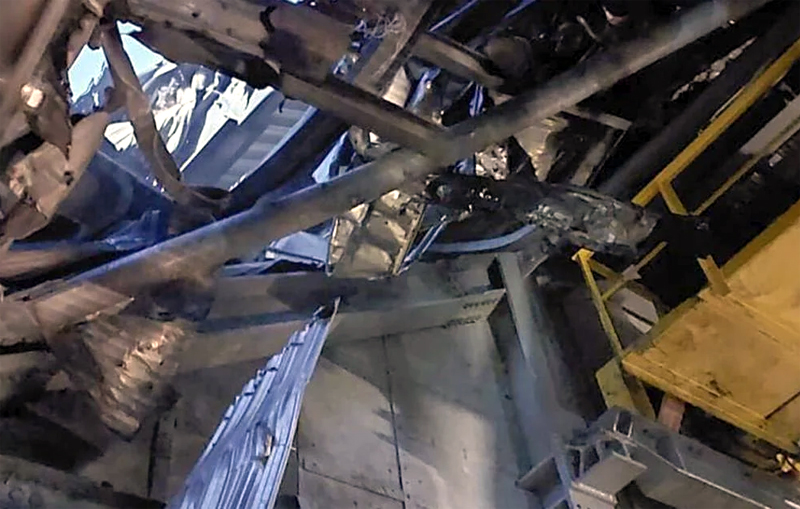KYIV, Feb 14: A drone equipped with a warhead struck the outer protective shell of Ukraine’s Chernobyl nuclear plant early Friday, causing damage to the structure and briefly igniting a fire. Ukraine attributed the attack to Russia, which the Kremlin denied.
According to the UN’s International Atomic Energy Agency (IAEA), radiation levels at the decommissioned plant—site of the 1986 nuclear disaster—remain unchanged, and the drone strike did not compromise the inner containment shell.
The IAEA reported that its team on-site heard an explosion and was informed of the drone’s impact, though it refrained from assigning blame.
Concerns about potential nuclear disasters have grown during the ongoing conflict, especially recalling the severe consequences of the Chernobyl disaster, which resulted in at least 30 fatalities and widespread radioactive fallout.
The Zaporizhzhia nuclear power plant, the largest in Europe, has also been targeted by drones during the conflict, though without significant repercussions.
The attack on Chernobyl occurred two days after former President Donald Trump indicated he would meet with Russian President Vladimir Putin to discuss a resolution to the conflict, a move seen as sidelining Ukrainian President Volodymyr Zelenskyy and European leaders in peace negotiations.
As Ukraine struggles against the larger Russian military across a 1,000-kilometre (600-mile) front, the need for increased Western support is pressing.
Zelenskyy stated that a Russian drone with a high-explosive warhead struck the plant’s outer shell, igniting a fire that has since been extinguished. The outer shell, constructed in 2016, was built over a heavy concrete containment structure that was established after the 1986 disaster in an effort to prevent radiation leaks.
The Ukrainian Emergency Service provided a photograph showing a hole in the outer shell, which is a massive steel-and-concrete structure weighing approximately 40,000 tons (36,000 metric tons) and large enough to accommodate Notre Dame Cathedral.
Kremlin spokesman Dmitry Peskov refuted claims of Russian responsibility, stating, “There is no discussion of strikes on nuclear infrastructure or facilities. Any such assertions are false; our military does not conduct such actions,” during a press briefing.
Independently verifying the origin of the strike is not feasible, as both parties frequently exchange accusations when nuclear facilities are attacked.
Peskov accused Ukraine of attempting to obstruct negotiations between Trump and Putin, asserting that certain elements within the Ukrainian government would try to derail diplomatic efforts.
“Clearly, there are individuals in Ukraine who will do everything possible to undermine the negotiation process,” Peskov remarked.
Ukraine intends to provide detailed information about the Chernobyl incident to U.S. officials during the Munich Security Conference commencing Friday, as tweeted by Andrii Yermak, head of Ukraine’s Presidential Office.
IAEA head Rafael Grossi highlighted that the Chernobyl strike and the rise of military activity near Zaporizhzhia “underscore the ongoing nuclear safety risks,” noting that the IAEA remains “on high alert.”
According to the IAEA, their personnel reacted within minutes of the strike, reporting no casualties.
“Radiation levels, both inside and outside, remain stable and normal,” the IAEA confirmed.
Zelenskyy claimed on Telegram that the incident at Chernobyl illustrates that “Putin is clearly not preparing for negotiations”—a sentiment echoed by Ukrainian officials.
“Only Russia has the capability to attack such facilities, occupy nuclear power plant territories, and engage in hostilities with total disregard for the consequences, posing a terrorist threat to the entire world,” he asserted.
“Russia must be held accountable for its actions,” he concluded. (AP)


Leave a Reply